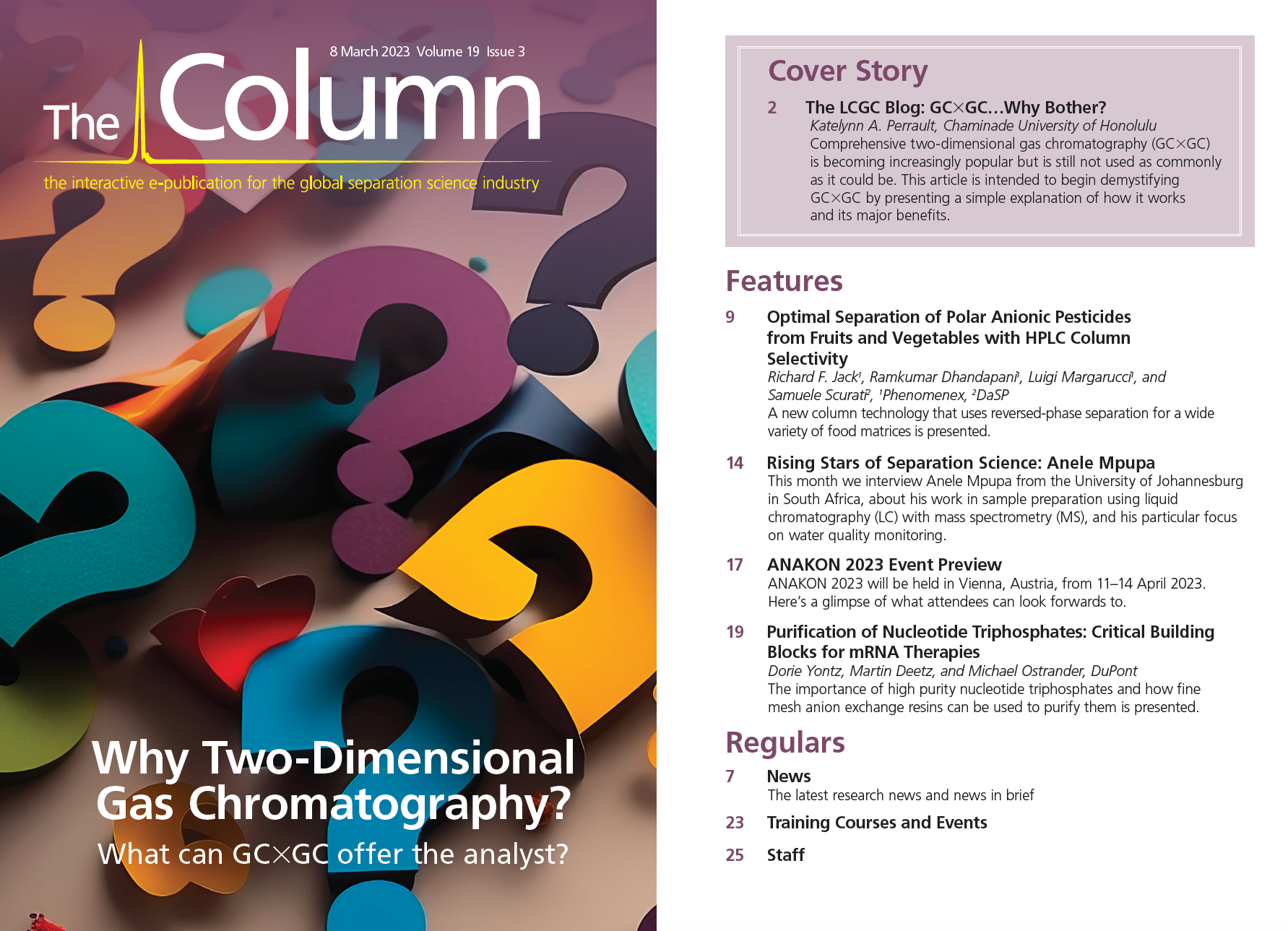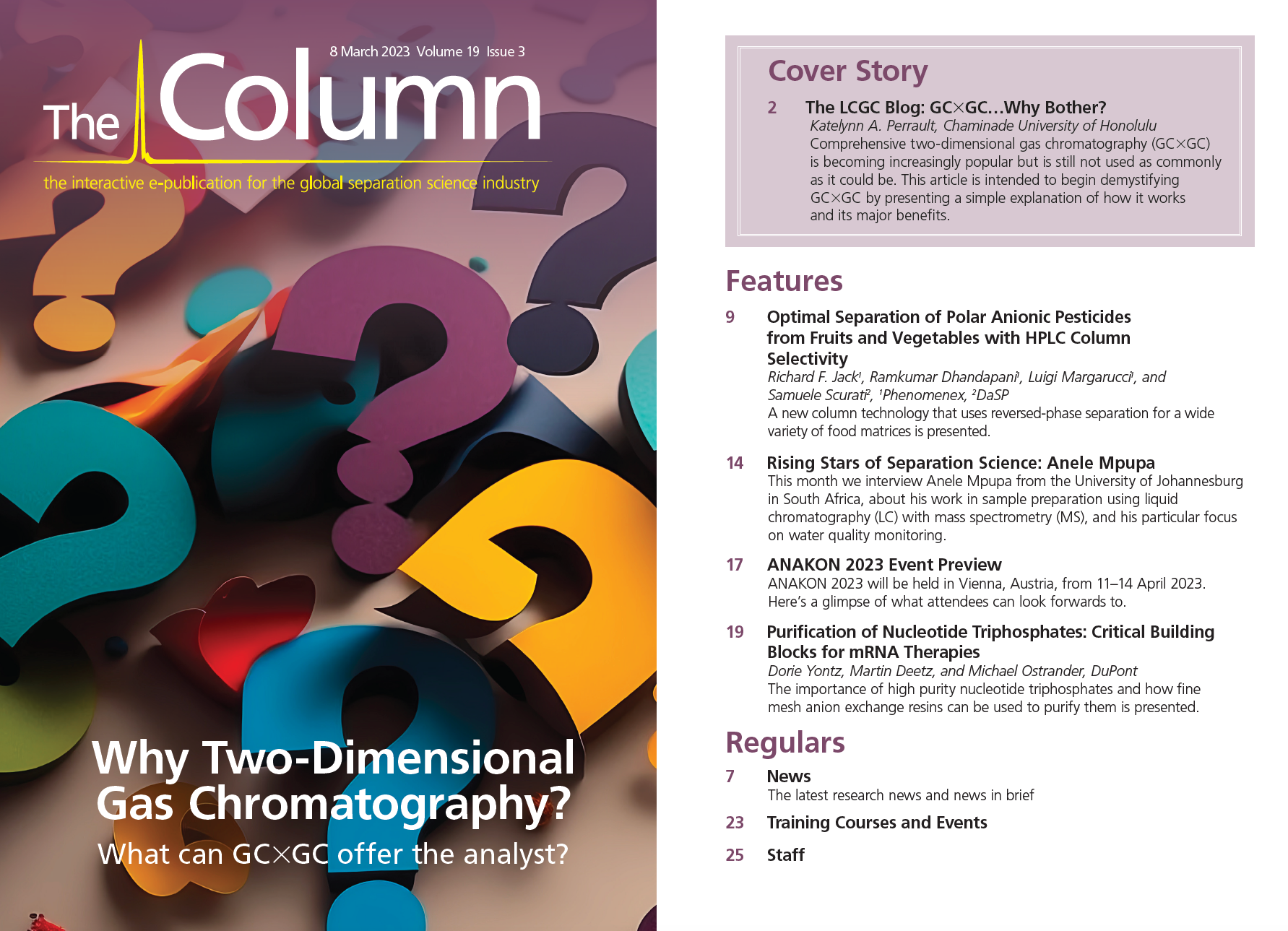Rising Stars of Separation Science: Anele Mpupa
This month we interview Anele Mpupa from the University of Johannesburg in South Africa, about his work in sample preparation using liquid chromatography with mass spectrometry (MS), and his particular focus on water quality monitoring.
This month we interview Anele Mpupa from the University of Johannesburg in South Africa, about his work in sample preparation using liquid chromatography with mass spectrometry (MS), and his particular focus on water quality monitoring.
Papers Mentioned in Interview
- Mashile, G. P.; Mpupa, A.; Nomngongo, P. N. Magnetic Mesoporous Carbon/β-Cyclodextrin–Chitosan Nanocomposite for Extraction and Preconcentration of Multi-Class Emerging Contaminant Residues in Environmental Samples. Nanomaterials 20201, 11, 540. DOI: 10.3390/nano11020540
- Selahle, S. K.; Mpupa, A.; Nomngongo, P. N. Liquid Chromatographic Determination of Per- and Polyfluoroalkyl Substances in Environmental River Water Samples. Arabian Journal of Chemistry 2022, 15, 103960. DOI: 10.1016/j.arabjc.2022.103960
- Mpupa, A.; Nqombolo, A.; Mizaikoff, B.; Nomngongo, P. N. Beta-Cyclodextrin-Decorated Magnetic Activated Carbon as a Sorbent for Extraction and Enrichment of Steroid Hormones (Estrone, β-Estradiol, Hydrocortisone and Progesterone) for Liquid Chromatographic Analysis. Molecules 2022, 27, 248. DOI: 10.3390/molecules27010248
Anele Mpupa obtained his bachelor of science (chemistry and microbiology) and B.Sc. (Hons) in chemistry from Rhodes University, South Africa. Later, he completed his M.Sc. and Ph.D. in chemistry from the University of Johannesburg, South Africa. He received funding from the National Research Foundation (NRF) from 2017–2020 for his M.Sc. and Ph.D., respectively; he was also a recipient of the highly competitive Deutscher Akademischer Austauschdienst (DAAD) German academic exchange service for a four‑month short stay research grant in Ulm University. He is currently a postdoctoral research fellow at the University of Johannesburg.
Dr Mpupa’s research focuses primarily on water quality monitoring, the analysis and removal of emerging pollutants in water matrices using nanomaterials. Emerging pollutants are chemical substances that fall out of standard monitoring and regulatory programmes. These chemicals often include new generations of pharmaceutically active compounds, pesticides, surfactants, and personal care products among others. These chemicals occur at low concentration levels, making their monitoring a challenge. Therefore, his research focuses on the development of adsorbent materials for the determination of emerging pollutants in water matrices. Furthermore, some of the developed materials are tested for their potential for the mitigation of the pollutants in water, with special attention being paid to efforts using recycled feedstocks.

New Method Explored for the Detection of CECs in Crops Irrigated with Contaminated Water
April 30th 2025This new study presents a validated QuEChERS–LC-MS/MS method for detecting eight persistent, mobile, and toxic substances in escarole, tomatoes, and tomato leaves irrigated with contaminated water.
University of Tasmania Researchers Explore Haloacetic Acid Determiniation in Water with capLC–MS
April 29th 2025Haloacetic acid detection has become important when analyzing drinking and swimming pool water. University of Tasmania researchers have begun applying capillary liquid chromatography as a means of detecting these substances.

.png&w=3840&q=75)

.png&w=3840&q=75)



.png&w=3840&q=75)



.png&w=3840&q=75)










